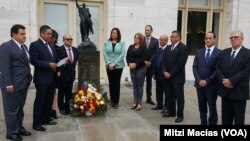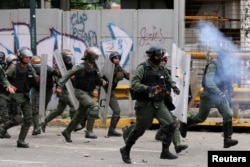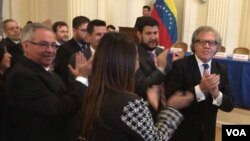Magistrates appointed by Venezuela’s opposition-led parliament were installed at a ceremony Friday at the Organization of American States’ Washington headquarters. Whether they are recognized as a valid Supreme Court forced into exile or a “parallel and illegitimate” entity is a matter of interpretation.
Domingo Javier Salgado, one of 18 magistrates at the late-morning ceremony, contends they’re part of the constitutionally mandated "autonomous and independent" bench – unlike the predominantly pro-government justices based in Caracas, the capital. "This is sending a very positive message both to the international community and to Venezuelans," he told VOA earlier this week.
Venezuela’s attorney general, Tarek William Saab, has called the magistrates illegal and dismissed their installation ceremony as "a macabre plan" – a ploy to get unwarranted credibility at home and abroad.
The event was not sponsored by the OAS.
But OAS Secretary General Luis Almagro – a fierce critic of Venezuelan President Nicolás Maduro – spoke at the ceremony, saying, "We deeply support the country’s democratic institutions, and in this sense today we welcome … the new supreme tribunal of justice."
Venezuela is one of the pro-democracy alliance’s 35 member states, though in April Maduro announced the country would leave the OAS, a two-year process.
Complex maneuvering
The installation represents one of the latest twists in a complicated saga.
Just before Maduro's political opponents took control of the parliament or National Assembly in early 2016, the ruling Socialist Party installed more like-minded justices on the high court, critics contend. Last March, amid an escalating political and economic crisis, the court tried to wrest legislative authority from the assembly – backing down after withering domestic and international criticism but setting off months of often-violent street protests. More than 120 people died.
In July, the National Assembly swore in 33 alternative judges – a move also condemned in some quarters as setting up a parallel system.
Maduro immediately ordered their arrest, calling them "usurpers" and freezing their assets.
"That forced us to take shelter outside the national territory," said Salgado, who was interviewed earlier this week via Skype from Miami, Florida, where he said he was "in transit."
Most of the assembly-appointed magistrates fled Venezuela. This week, five showed up in Santiago, Chile, after spending the interim under the protection of that country’s embassy in Caracas.
Three others have quit, Salgado said. As for the rest, "Venezuelans can be sure that their justices, who were duly sworn in, will continue fulfilling the constitutional duties for which they were appointed."
He did not elaborate on how he and his colleagues would work or from what location.
'Illegitimate' or 'situation of hope'?
Salgado said the assembly-appointed magistrates’ installation creates "a situation of hope" for Venezuelans.
"Little by little," he explained, "we’re going to restore autonomy and independence" to the judicial and legislative branches, as the constitution requires. These should not be subordinate to the executive branch, he added.
The installation "has symbolic importance," said Michael Shifter, president of the Washington-based think tank Inter-American Dialogue.
"This is an effort to try to project that the opposition in the National Assembly is legitimate," he said. Democratically elected in 2015, the legislature’s members have "the right to pick a Supreme Court. … But this has been completely annulled by the Maduro regime."
The legislature has been overshadowed by the powerful and controversial new Constituent Assembly, whose 545 members were chosen in a July 30 election widely considered a sham. It’s not formally recognized by the United States and many other regional neighbors, as well as the European Union.
Alexander Main, an international policy expert at the Washington-based Center for Economic and Policy Research, anticipates a negative response to installing "this parallel and illegitimate Supreme Court."
"It’s not actually with the mandate of the member countries of the OAS," Main said. He denounced the move as "a personal initiative" by Almagro, "who has waged a relentless campaign against the government of Maduro. …"
Main also questioned the symbolism of "establishing a parallel court in the heart of Washington, D.C., only a few meters from the White House and from Donald Trump. I think it will be very striking for Venezuelans, and I don’t think it will play in favor of the opposition."






